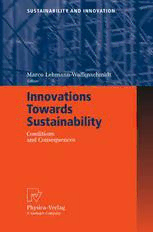
Innovations Towards Sustainability: Conditions and Consequences PDF
Preview Innovations Towards Sustainability: Conditions and Consequences
Sustainability and Innovation CoordinatingEditor JensHorbach UniversityofAppliedSciencesAnhalt,Bernburg,Germany SeriesEditors EberhardFeess RWTHAachen,Germany JensHemmelskamp UniversityofHeidelberg,Germany JosephHuber UniversityofHalle-Wittenberg,Germany RenéKemp UniversityofMaastricht,TheNetherlands MarcoLehmann-Waffenschmidt DresdenUniversityofTechnology,Germany ArthurP.J.Mol WageningenAgriculturalUniversity,TheNetherlands FredSteward BrunelUniversity,London,UnitedKingdom Sustainability and Innovation PublishedVolumes: JensHorbach(Ed.) IndicatorSystemsforSustainableInnovation 2005.ISBN978-3-7908-1553-5 BerndWagner,StefanEnzler(Eds.) MaterialFlowManagement 2006.ISBN978-3-7908-1591-7 A.Ahrens,A.Braun,A.v.Gleich,K.Heitmann,L.Lißner HazardousChemicalsinProductsandProcesses 2006.ISBN978-3-7908-1642-6 UlrikeGrote,ArnabK.Basu,NancyH.Chau(Eds.) NewFrontiersinEnvironmentalandSocialLabeling 2007.ISBN978-3-7908-1755-3 Marco Lehmann-Waffenschmidt (Editor) Innovations Towards Sustainability Conditions and Consequences With38Figuresand21Tables Physica-Verlag ASpringerCompany ProfessorDr.MarcoLehmann-Waffenschmidt DepartmentofEconomics DresdenUniversityofTechnology 01062Dresden Germany [email protected] LibraryofCongressControlNumber:2007932634 ISSN1860-1030 ISBN978-3-7908-1649-5Physica-VerlagHeidelbergNewYork Thisworkissubjecttocopyright.Allrightsarereserved,whetherthewholeorpartofthematerial is concerned, specificallythe rights of translation, reprinting, reuseof illustrations, recitation, broadcasting,reproductiononmicrofilmorinanyotherway,andstorageindatabanks.Duplication ofthispublicationorpartsthereofispermittedonlyundertheprovisionsoftheGermanCopyright LawofSeptember9,1965,initscurrentversion,andpermissionforusemustalwaysbeobtained fromPhysica-Verlag.ViolationsareliabletoprosecutionundertheGermanCopyrightLaw. Physica-VerlagisapartofSpringerScience+BusinessMedia springer.com ©Physica-VerlagHeidelberg2007 Theuseofgeneraldescriptivenames,registerednames,trademarks,etc.inthispublicationdoes notimply,evenintheabsenceofaspecificstatement,thatsuchnamesareexemptfromtherelevant protectivelawsandregulationsandthereforefreeforgeneraluse. Production:LE-TEXJelonek,Schmidt&V¨ocklerGbR,Leipzig Cover-design:WMXDesignGmbH,Heidelberg SPIN11549413 88/3180YL-543210 Printedonacid-freepaper Contents Foreword Alexander Grablowitz .............................................VII Preface Marco Lehmann-Waffenschmidt.................................... IX List of Contributors ........................................... XI Part I New Approaches to Environmental Innovation Policy Windows of Opportunity for Radical Technological Change in Steel Production and the Influence of CO2 Taxes Christian Lutz, Bernd Meyer, Jan Nill, Joachim Schleich ............. 3 Comment: Approaches to the Modelling of Innovations for Sustainable Economic Systems Klaus Rennings.................................................. 19 Environmental Innovation Policy. Is Steering Innovation Processes Possible? Ren´e Kemp, Stefan Zundel ........................................ 25 Comment: Moderating Instead of Steering? Frank Beckenbach ................................................ 47 TransitionManagementintheElectronicsIndustryInnovation System: Systems Innovation Towards Sustainability Needs a New Governance Portfolio Joachim Hafkesbrink ............................................. 55 VI Contents An Example of a “Managed Transition”: The Transformation of the Waste Management Subsystem in the Netherlands (1960-2000) Ren´e Kemp ..................................................... 87 Comment: Management of Industrial Transformation: Potentials and Limits from a Political Science Perspective Klaus Jacob ..................................................... 95 Part II Innovations and Sustainability Leading Innovations to Sustainable Future Markets Klaus Fichter, Reinhard Pfriem....................................103 Comment: Sustainable Future Markets and the Formation of Innovation Processes Klaus Burmeister ................................................117 Directional Certainty in Sustainability-Oriented Innovation Management Niko Paech......................................................121 Comment: Innovation Ability and Innovation Direction Arnim von Gleich................................................141 Part III Arrangements in Society and Economy Towards Sustainability Deceleration – Revealed Preference in Society and Win- Win-Strategy for Sustainable Management. Concepts and Experimental Evidence Edeltraud Gu¨nther, Marco Lehmann-Waffenschmidt ..................157 Comment: Deceleration as a New Paradigm of Economic Science? Fritz Reheis .....................................................183 Assessment Criteria for a Sustainability Impact Assessment in Europe Raimund Bleischwitz .............................................191 Comment: Regulatory Choice and Responsive Regulation for Sustainability Kilian Bizer.....................................................211 Foreword In 1999, the German federal ministry of education and research (BMBF) decided to include two new priorities in its environmental research policy portfolio. One was concerning socio-ecological research aiming at a better understandingofthesocialdimensionofthesustainabilitytriadandtheother onewasoninnovationorientedresearchaimingatabetterunderstandinghow companies and public authorities can influence innovation activities towards the sustainability objectives. The latter priority led to two new programme lines, one targeting at the company level and the other one targeting at the publicpolicylevelundertheheadlineof“frameworkconditionsforinnovations towards sustainable development” (RIW). The projects funded under the RIW programme were analysing the po- tential innovation impact of environmental policy measures on the one hand and the sustainability impact of other policies, such as innovation policy, on the other hand. The design of the RIW programme included in addition an international outreach dimension with the organisation of international con- ferences as well as the establishment of collaboration platforms among the funded projects in order to allow for more general conclusions. The RIW programme followed the BMBF tradition to foster multi- or interdisciplinary cooperation,notablyinvolvingacademicsfromeconomics,policysciences,and law. The selected projects were dealing with concrete, often innovative, policy measures or concepts, such as the lead market concept for instance. When looking at the policy topics discussed today, it can be confirmed that the ’right’projectshavebeenchosen.TheRIWprogrammealsoincludedacluster of projects concerning the new chemicals policy of the European Union, the REACHregulation,whichrecentlyenteredintoforce.Italsoincludedprojects concerning policy strategies, addressing the role of public procurement or the potential of the lead market concept, and finally a cluster of projects concerning specific innovation systems such as the electronics market, the CO2 emission issue in steel production, the water sector, or the recycling of motor vehicles parts. All these topics can be found to date on the policy agenda of both, the national and the European level. Itcanbe assumedthat the results ofthe projects weretakenup by policy makersandactedasa triggerformoreacademicworkinthis regard.Current policydeclarations-notonlybytheGermanenvironmentministry-callingfor a revised understanding of sustainable development as a driver of innovation and not as a barrier underline the relevance of the RIW programme and its VIII Foreword outputs. One of its products you are holding in your hands, and I hope you will find it as inspiring and insightful as I do. IextendmygratefulthankstoMarcoLehmann-Waffenschmidttoleadthe RIW working group and to put all the material together, and to the authors andcontributorswhoprovidednewinsightsintoopportunitiestousetheforce of innovation to realise a more sustainable world. Sevilla, March 2007 Alexander Grablowitz Preface In spring 2001 the German “Bundesministerium fu¨r Bildung und Forschung” (federal ministry of education and research) launched research grants on the topic,,Rahmenbedingungenfu¨rInnovationenzumnachhaltigenWirtschaften“ (frameworkconditionsforinnovationstowardssustainabledevelopment,,,Fo¨r- derschwerpunkt RIW“, see also www.riw-netzwerk.de). It was part of the organizationalstructureofthe“RIWproject”toformseveralworkinggroups out of the accepted project teams with the dedication to gather and organize the knowledge to be developed during the three-years-researchgrants across the single project teams. As chair of the working group “Innovations and Sustainable Development” I organized several workshops between 2002 and 2005 where we discussed and developed our ideas on this topic. The result of thisdiscourseisnowavailableinthecollectionofcontributionsofthisvolume. Ithasbeenmyambitiontoreflectthevividnessoftheintellectualdiscourse by presenting each of the researchcontributions together with a criticalcom- mentbyanexpertinthefield.Thus,thevolumeconsistsofsixpairsofamain contribution and a comment and one “triple” (with two main contributions) writtenby20authors.To be sureavolumelikethis withlittle morethan200 pagescannotgiveatruly exhaustiveaccountonthestateoftheartinatopic soimportantastheinterrelationsbetweeninnovationsandsustainability.But undoubtedly it appearsto be worthwileto provide a representativecollection ofinstructivepapersonthistopiclikethepresentonescombiningcasestudies with principal thoughts. Thevolumeisdividedintothreeparts:I.NewApproachestoEnvironmen- tal Innovation Policy, II. Innovations and Sustainability, and III. Arrange- ments in Society and Economy Towards Sustainability. In Part I Christian Lutz, Bernd Meyer, Jan Nill, and Joachim Schleich identify and examine the “WindowsofOpportunity forRadicalTechnologicalChangein SteelProduc- tion and the Influence of CO2 Taxes” (with a comment by Klaus Rennings), andRen´eKempandStefan Zundeldealwith the questionof“Environmental Innovation Policy. Is Steering Innovation Processes Possible?” (commented by Frank Beckenbach). Part I is completed by two case studies on the issue of transition management by Joachim Hafkesbrink “Transition Management in the Electronics Industry Innovation System: Systems Innovation towards Sustainability Needs a New Governance Portfolio” and by Ren´e Kemp “An Example of a “Managed Transition”: The Transformation of the Waste Ma- nagement Subsystem in the Netherlands (1960-2000)”,which are in a “triple format” commonly commented by Klaus Jacob.
